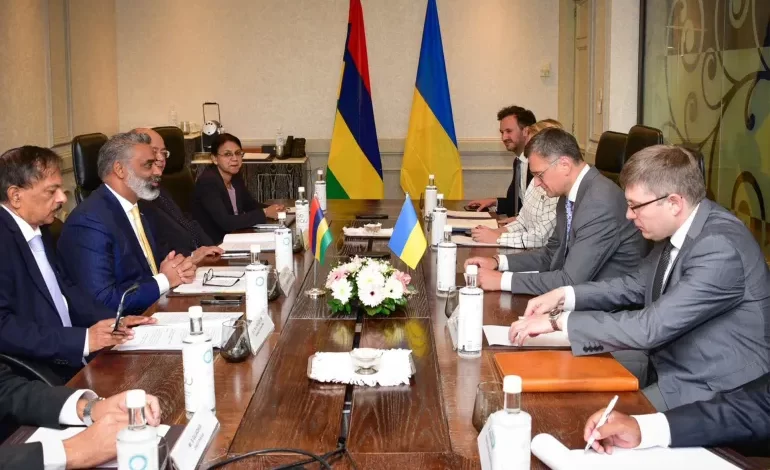Is Ukraine Seeking to Open a New Front Against Russia in Africa?

Safwan Joulak
Kyiv– In an effort to enhance its growing presence in Africa and mitigate the effects of African countries cutting ties with it, Kyiv’s Foreign Minister Dmytro Kuleba has undertaken a new tour of the continent, which included Malawi, Zambia, and Mauritius.
This visit, which is Kuleba’s fourth to Africa since the outbreak of the war with Russia, coincides with Mali and Niger severing their relations with Ukraine, amid allegations that Ukraine supports rebels against the two countries’ forces and the Russian-backed “Wagner” mercenaries.
Over the past two years of the war, Kuleba’s tours in Africa have covered 12 countries, paralleling 14 countries visited by Russian Foreign Minister Sergey Lavrov on the continent, reflecting an intense competition between Kyiv and Moscow for influence and interests in Africa, according to observers.
After the collapse of the Soviet Union in 1991, Moscow inherited all diplomatic institutions in Africa; Kyiv accepted this division without significant objections at the time. Over the 30 years before the war, Ukraine had embassies in only 10 out of 54 African countries.
However, the war launched by Russia against Ukraine seems to have reminded Kyiv of the importance of this part of the world. Over the past two years of the war, Ukraine has made significant strides in expanding its network of relationships, opening 10 new embassies in African countries; an action Moscow views as a “second front” against it.
The Importance of Africa
The countries where Ukraine has recently opened embassies received hundreds of thousands of tons of Ukrainian grain, under what was known as the Grain Agreement, initially mediated by the United Nations and Turkey between Russia and Ukraine, and later under the “Grain Initiative” launched unilaterally by Ukraine; thus reducing Russia’s “monopoly” on the grain market in Africa, according to experts.
Ukraine has also signed visa waiver agreements with some African countries, such as Mauritius during Kuleba’s visit.
Roman Pryadun, a writer for the Ukrainian newspaper “Obozrevatel,” believes that Africa’s importance to Ukraine lies in the continent’s broad potential, as some of its countries show significant economic growth, a large and young consumer market, and according to the United Nations, by 2050, “a quarter of the world’s population will live in Africa.”
Pryadun told Al Jazeera that “the influence of African countries on the international stage is increasing, with 54 African countries making up 28% of the United Nations’ 193 members, and the African Union seeking membership on the UN Security Council, and it is already a member of the G20.”
He explains the international political weight of Africa for Kyiv by saying: “Typically, slightly more than half of the continent’s countries vote in favor of decisions that support Ukraine, while others abstain from voting to remain neutral or avoid creating tension with Russia.”
In the same context, Ghana, Liberia, Niger, and Côte d’Ivoire joined the “Crimea Platform” conference in 2022, aimed at restoring Crimea to Ukrainian control; Kenya, Liberia, Morocco, and Tunisia also joined the defense group for Ukraine under the “Ramstein” format (the contact group for Ukraine’s defense was first convened in Ramstein, Germany); and 10 African countries supported Russia’s exclusion from the UN Human Rights Council. However, none of the African countries have imposed any sanctions on Russia since the beginning of the war, as noted by Pryadun.
The Ukrainian writer believes that “Kyiv needs to change this equation decisively in its favor, combat Russian disinformation in Africa, and increase diplomatic presence and encourage Ukrainian business activity on the continent.”
A Gateway to the Silent World
The Russian war on Ukraine has shocked the African continent, particularly as it has destroyed traditional food supply routes and sharply increased prices.
From this perspective, experts believe that Africa is the best gateway for Ukraine to mobilize the “silent world” against Russia and change the positions of most Asian and Latin American countries as well.
Victor Timofeev, a writer for the “Korotko” website, says that “African leaders are increasingly concerned with an early end to the war and are generally aware of the reality of the situation and the consequences of Putin’s actions.”
Timofeev told Al Jazeera that “the Russian-African summit held in 2023 had good indicators for Ukraine, as it included only 17 presidents from the continent, compared to 43 in the 2019 summit,” and he sees this as paving the way for changing stances and even moving towards pressure and sanctions against Russia.
A Front to Strike Russian Interests
The African continent is a viable front for striking at Russian interests in Africa, which are more extensive than Ukraine’s interests, although this may not be easy.
Timofeev says: “The African continent is now a gold mine for Russia, providing it with illegal black income. Several countries under Russian control in Africa give the Kremlin direct funds and access to extract gold, diamonds, and other minerals.”
He continued: “Removing Russia from African countries is a matter of geopolitical prestige for Ukraine and limits Moscow’s ability to replenish its resources for continuing the war.”
Despite Kyiv denying adopting this approach, many do not rule out that Ukraine might support any movement against Russian military influence in Africa as well, even if it negatively impacts relations with some of these countries. Pryadun says: “With Russian support, military councils have carried out coups and come to power in some African countries, and they are trying to defend themselves with the help of Russian trainers and Wagner mercenaries.”
Pryadun believes this is a possibility for Ukraine and could signify “a rapprochement with France,” which has had deteriorating relations with those countries; it also represents a source of relief for China, which seeks to expand its influence, a goal that conflicts with significant Russian presence on the African continent.
Source: Al Jazeera



